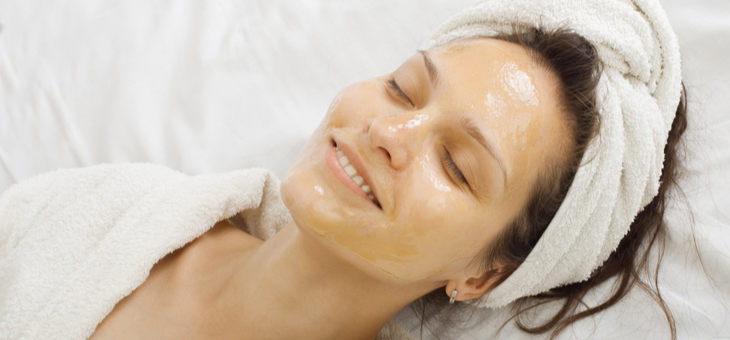It’s easy for your skin to dry out in winter. Moving between hot and cold climates can draw moisture away from the skin. With COVID-19 making trips to the pharmacy and supermarket less attractive, it’s the perfect time to treat yourself to a facial at home from ingredients you already have in your cupboard, namely honey.
We often sing the praises of the health benefits of honey. When consumed it is known to help fight the common cold, soothe a sore throat and have antibacterial properties. It’s also used in a number of beauty products including face washes, hair masks, bee soap and natural moisturisers, most of which have a hefty price tag attached.
These four DIY honey face masks will save you money and cut out all the added nasties.
Manuka honey face mask to reduce inflammation
All you’ll need for this mask is raw Manuka honey. Honey has anti-inflammatory and antibacterial properties, so it can help to reduce breakouts and calm the skin. “Using honey by itself really is an effective skin clearing, nourishing and revitalising treatment,” research scientist Marisa Plescia told Mind Body Green (MBG).
You can use a honey mask as frequently as you’d like, though just once or twice a week is enough to gain the benefits.
How to apply:
- Wash your face with warm water.
- Apply an even layer of raw Manuka honey to damp skin. You can use a spoon or your fingers if you don’t mind them getting sticky.
- Let the face mask sit on your skin for 20 minutes before washing off with warm water.
- Apply moisturiser, cream or oil as normal to seal in the moisture.
While a simple Manuka honey face mask is easy to use and great for the skin, some simple variations can offer added benefits.
Yoghurt, oat and honey mask to exfoliate skin
You may not have thought that something as smooth as yoghurt can help to exfoliate your skin, but it’s packed with lactic acid, which helps to remove dead skin cells. It’s also a great natural alternative to store bought exfoliators for people who have sensitive skin.
How to make:
- Mix one teaspoon of full fat yoghurt, one teaspoon of Manuka honey and one tablespoon of finely ground oatmeal together in a small bowl.
- Apply this paste evenly to your skin.
- After 15 minutes wash off the mask using warm water.
Turmeric, honey and lemon mask to brighten skin
Not only can consuming lemon help you look younger, it is packed with vitamin C that can help to reduce the appearance of dark spots on the skin. The active ingredient in turmeric is curcumin, which has known antioxidant properties. It can help to protect your skin from damage caused by free radicals. According to MBG, this mask helps to make skin appear brighter and healthier.
How to make:
- Mix one teaspoon of ground turmeric, half a teaspoon of lemon juice and one tablespoon on raw Manuka honey in a small bowl.
- Apply the mixture to the skin using the back of a spoon.
- After 10 minutes the mask will begin to harden on your skin. Wash it off using warm water.
Aloe, mint and honey mask to soothe skin
You don’t need to be sunburnt for aloe vera to be great for your skin. The plant contains vitamins, antioxidants, minerals and amino acids and has a number of healing properties. Mint is found in many skin-care products because of its health benefits. It contains salicylic acid that helps to prevent acne, is an anti-inflammatory, tones and smooths the skin and helps to delay the appearance of fine lines and wrinkles.
How to make:
- Mix equal parts Manuka honey and aloe vera gel (feel free to use fresh aloe if you grow the plant in your garden), with three crushed mint leaves. If you have rosewater at home, add a few sprays to the mix.
- Apply to the skin and let it sit for around 20 minutes.
- Rinse off with warm water.
Do you prefer to use store bought or home-made face masks? Are there any other DIY masks our readers should know about? Share them in the comment section below.
If you enjoy our content, don’t keep it to yourself. Share our free eNews with your friends and encourage them to sign up.
Related articles:
https://www.yourlifechoices.com.au/health/wellbeing/the-truth-about-honey
https://www.yourlifechoices.com.au/health/wellbeing/skin-changes-you-should-know-about
https://www.yourlifechoices.com.au/health/your-health/are-skin-tags-dangerous
Disclaimer: This article contains general information about health issues and is not advice. For health advice, consult your medical practitioner.

